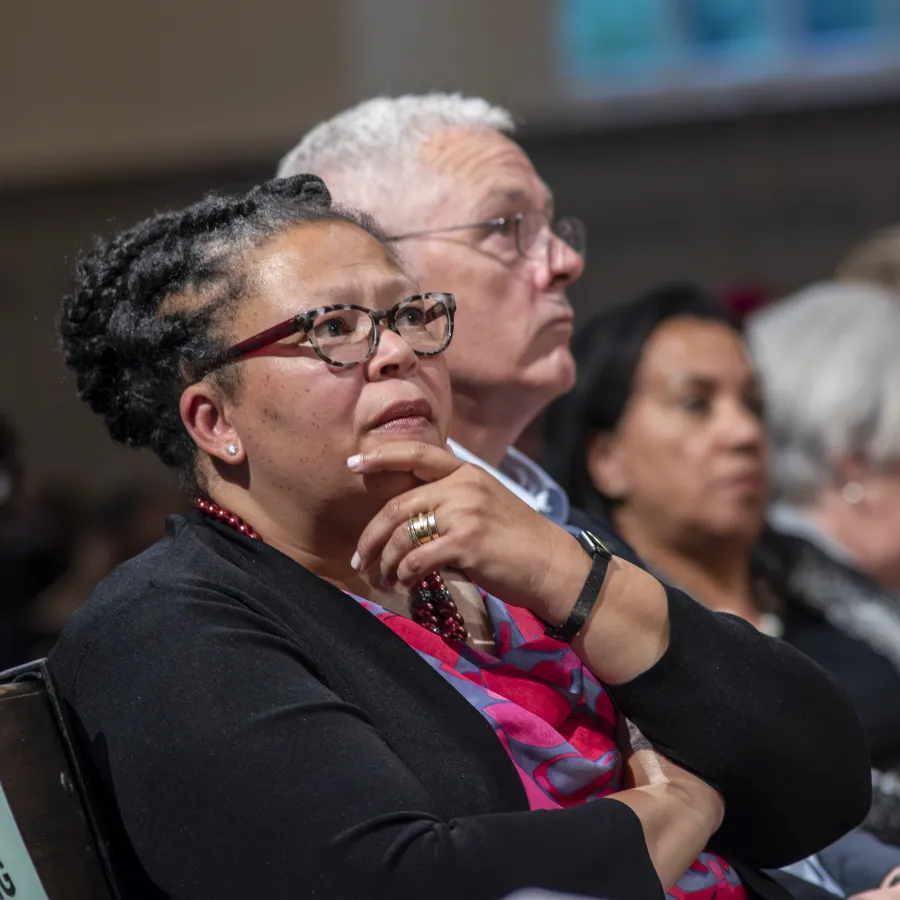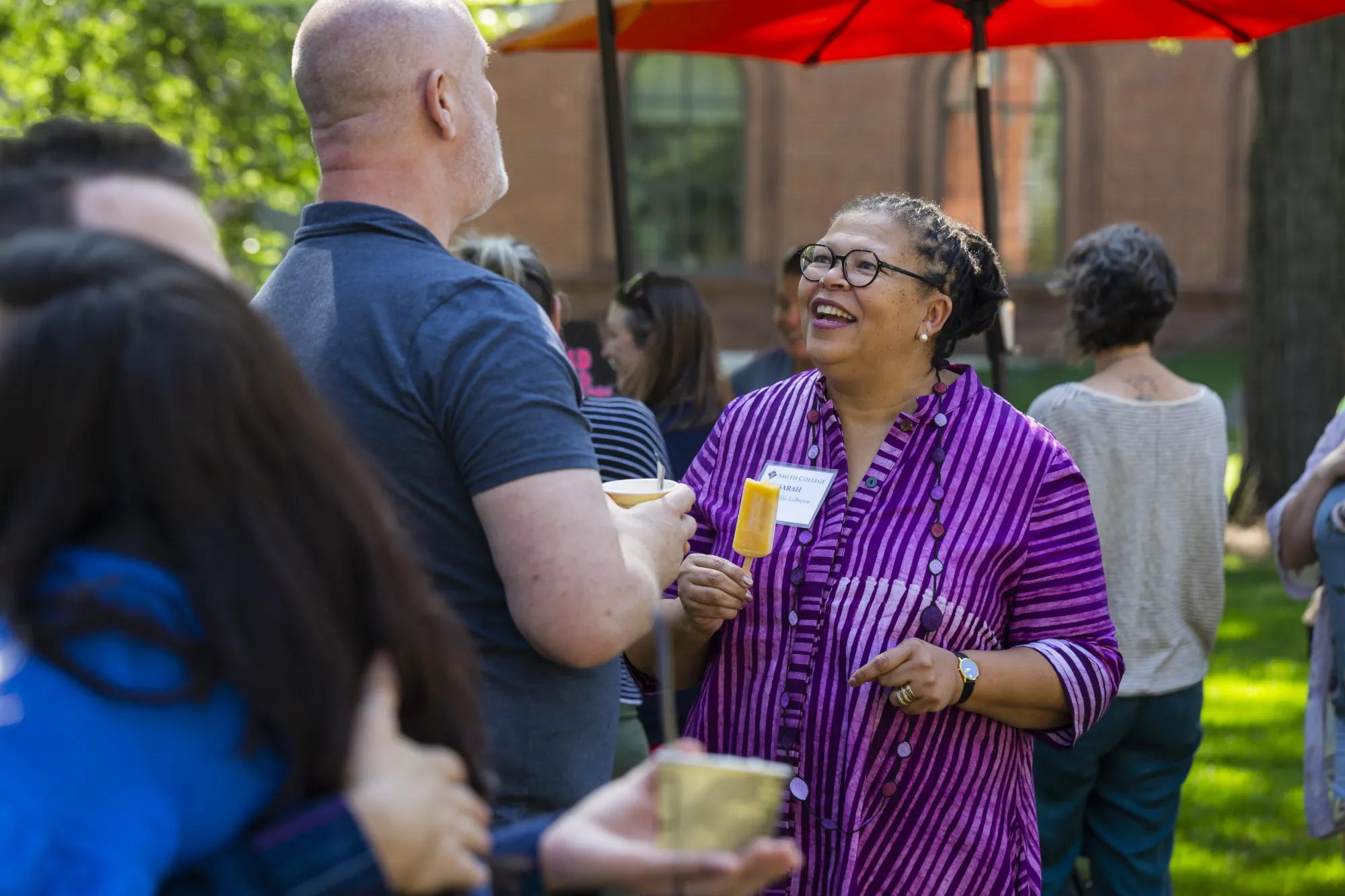Conversations with Sarah: The Power of Active Listening
News of Note
President Sarah Willie-LeBreton reflects on the power of active listening

Photograph by Tracy Eller
Published January 16, 2024
Ever since she was appointed president of Smith, Sarah Willie-LeBreton has been asked to do a lot of talking about herself. “It’s only natural,” she says. “When you start a new job, people want to know all about you.” But what she’d really like to do is listen to what others have to say. That’s why she’s made listening a central theme of her first year as president. On campus, she’s held one-on-one and group meetings with students, faculty, and staff to hear their thoughts about what makes Smith special and what priorities might shape the college’s future, and she is beginning to travel around the country on a “listening tour” to hear alums’ stories. Here, she discusses the value in hearing each other speak, especially at a time when there is so much division in the world; how she learned to listen; and the ways listening informs her leadership style.
Why did you make listening a central theme of your first year as president?
I have to answer your question with a question. Why would I come to a new organization and think I knew everything about it? There are certainly approaches, attitudes, and ideas that the various constituents of Smith hope I will bring to the college. In order to bring the right things forward, I need to know the place a bit better, and I don’t know any way to know a college and its participants better than by listening to them. My first few months have been particularly challenging in the face of horrific violence and suffering in the world. In such moments, many people have strong ideas about how the president should behave and what the president should say on behalf of the college; and we all forget to listen sometimes. This is one of those extended moments when I have to be clear about my values, clear about the mission of the college, clear about my current role, and clear to listen through pain, rage, and disappointment.
The paradox of being new and on a listening tour, of course, is that people say that they want to know about me and what I think, so they invite me to talk. In small groups, I try to ask people about their experiences. I have discovered that Smithies, whether they’re undergraduates, faculty, staff or alums, are eager to let me know what’s on their minds, and those exchanges have been absolutely delightful, and, even when they are not, they’ve been extraordinarily instructive. I also want to make sure that I’m hearing from those who are not as comfortable speaking.
Have you sensed that the community appreciates your willingness to engage and listen?
I have. In fact, I've reached out to several student groups because I've been concerned about how they're doing, how they're managing, metabolizing the extreme violence here and elsewhere in the world, particularly around Israel and Palestine, and managing their lives here on campus. In those instances, I don't do a lot of talking. I’m hoping that this also models the importance of listening to each other.
Sometimes we all forget, or are even disappointed by, the fact that, even when we share demographic similarities, we’re not always in agreement. So I think it’s been really important for students and faculty to hear each other speak, either affirming each other or realizing, “Oh, we have really different experiences and realities.” That can only happen if we all take turns at being quiet.
There must be some comfort in that for students, knowing that you provide that space for listening.
I hope so. I think each of us knows deep in our hearts that listening is important because it’s so meaningful to us when people listen to us. Listening doesn’t mean that we’ll suddenly agree with each other or behave exactly as the other wants. It does mean acknowledging each other, and, at its base, I believe that acknowledgment is love. As we acknowledge each other, our minds and attitudes and thinking open up to modification, expansion, and transformation. We become less judgmental and more loving and—particularly important for the campus setting—we become more intellectually flexible and insightful.
When did you come to understand the value of deep listening?
The short answer is that I came to value its importance over time, but there are three moments that stand out for me:
First, for much of the time I was growing up, my parents held a regular Family Council. It was not completely democratic, but it was an opportunity to share concerns and voice opinions. That was a powerful experience of being listened to and a place to practice, with a bit of courage, saying what was on my mind.
Second, when I became a provost and dean of faculty, I took a professional development program in which the facilitators had participants practice listening to each other in small groups, only asking clarifying questions of each other, and not automatically giving advice. Everyone took turns at speaking and listening. As a listener, I learned that I could offer help and gain insight primarily by witnessing my fellows’ challenges.
Finally, I have a coach who is also a friend. Over time, he noticed my compulsion to jump in and problem-solve for others when I was in a group setting. He gently advised me to hold back and listen. That was only a year ago, and I share that because listening is both developmental and an ongoing practice.

President Sarah Willie-LeBreton listens intently at a meet-and-greet ice cream social with Smith community members in August 2023.
Photo by Sabato Visconti
Meaningful listening does force us to take a step back before we jump in with a solution.
It absolutely does, and it’s really hard not to jump in, isn’t it? Those of us who are employees have often been hired because we have often solved problems in the past, and our supervisors hope that we’ll solve the problems of the present and the future. Some of us who are students believe that we’ve been admitted to school because we’re problem solvers or individuals with clear voices. Add to that, many of us have been told how excellent we are at problem solving, how quickly we do so, and how well we speak; the combination of those compliments makes it particularly difficult to slow down, listen, cogitate, discuss, and consider. But when we do, there’s so much more that we hear! So I think, yes, slowing down, pausing, listening helps us be more effective in our relationships, at work, at school, with friends, and at home. I'm finding that it’s certainly helping me.
That leads to my next question: How does listening inform your leadership style?
Profoundly. For me, leading is being clear about one’s values; it’s listening and really hearing where there’s consensus and appreciating where there is not, synthesizing points of view, lifting those up together with our shared values and showing them back to the people in the community.
I understand that there are members of this community who have a very different perspective than I do of my job. And don’t get me wrong: I have strong opinions about so much going on in the world, not only in Israel and Palestine but also in other countries, across the United States, in the Commonwealth of Massachusetts, and in Northampton. As a sociologist, I believe that complicated social systemic analyses of violence, ideologies of oppression, and neoliberalism are all crucial for us to wrestle with and to try to understand.
I am also very clear that making statements on behalf of the college runs the risk of undermining the very thing that makes college life precious: the kind of evidence-based exchanges that are the hallmark of American higher education. I don’t want to chill those exchanges, but nor will I tolerate threats of violence in this community. And so I will continue to do everything in my power to ensure that this college remains a place where faculty have the freedom to pursue research that may question taken-for-granted assumptions; where students and faculty are expected to learn, change their minds, and are truly free to share their analyses; where we expect that people will exchange ideas and express their opinions vigorously and respectfully and will be swayed if their minds change. Smith must continue to be a place where people can peacefully assemble and argue and even protest, but most especially where students and faculty can listen to each other, engaging in far-ranging, deeply meaningful conversations without fear of reprisal or retribution. These principles are crucial so that we understand what’s required of us in democratic living and citizenship at both the level of the world and with our neighbors.
As you’ve listened to our community over the past five months, what have you heard?
I have learned that we, as faculty, students, staff, and administrators have always brought our own stories, our gifts, and our misconceptions and prejudices about others to campus. I have learned that some of us have felt the sting and implications of those misconceptions and prejudices. And I have also learned that’s not where the story ends. I’ve been struck by how many of our alumnae have returned to Smith—as donors, as volunteers, as members of advisory committees to the botanical garden, the Museum of Art, alumnae relations, the board of trustees, and as faculty and staff employees—to continue the work of bringing the college into its fullest potential. I have also seen and heard current students share with me how they found ways to intervene in the anxious silence that is sometimes misinterpreted as disengagement, how they have reached out to talk with friends who may disagree with them, and how they have apologized to fellow students when they unwittingly caused pain. Those are brave students and brave conversations and I am inspired by them.
We often think of listening as a passive act, but you’ve spoken about the value of active listening. How do you see active listening as a tool for breaking through the noise we face every day and creating understanding and connection?
When you listen actively, you obviously don’t just listen to the words. You’re also watching body language. You’re also trying to appreciate context. Active listening is a practice that most of us do well with a few people in our lives but not with everyone. It takes time, and it leads to greater sophistication in our thinking, in our approaches to living, and in the way we do community. It’s particularly helpful if what you are hearing doesn’t match up with the emotion someone is demonstrating or if it doesn’t seem logical. When we listen actively, we can suss out what’s behind the words with gentle queries. Similarly, if you are thinking about the context from which a person is speaking and you’re watching body language and you’re listening carefully, you may come to understand that the source of someone’s immediate anxiety, fear, anger, pain, or frustration that they’re experiencing, is, in fact, something different, and perhaps adjacent to or deeper, than what you initially thought. Context, emotional valence and our own calm all help us to offer us the greater likelihood of better hearing, and that leads to greater understanding. None of us ever completely get to the root of things, but active listening can offer us a little more color, a little more appreciation, a bit more compassion and these things taken together lead to things that have profound implications for human society.